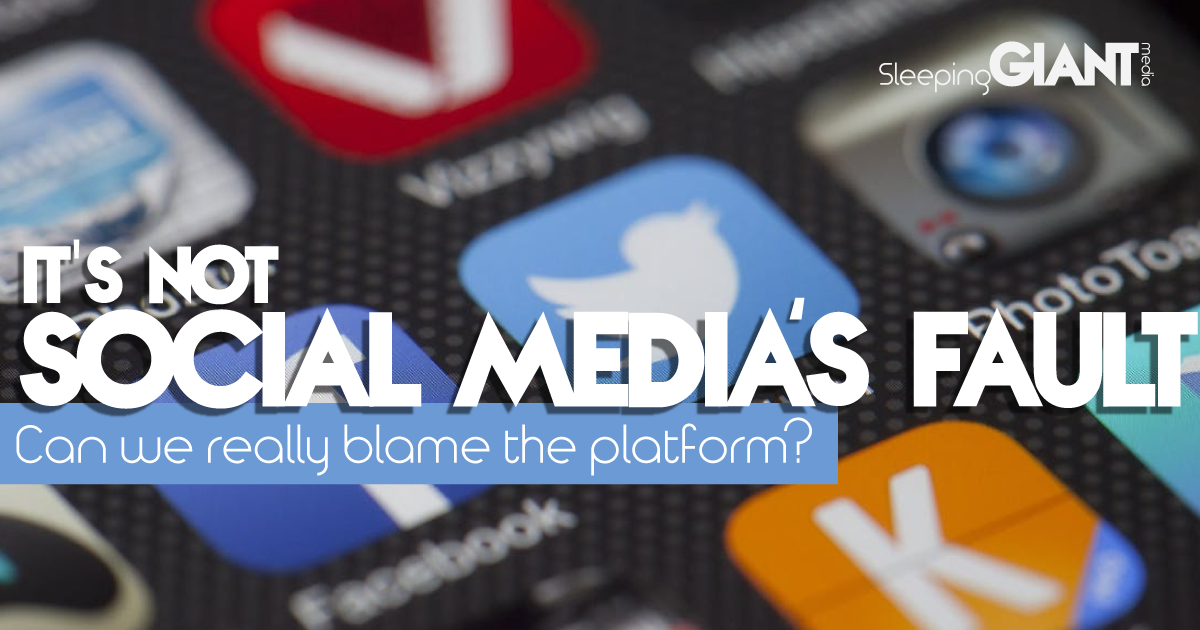When social media launched into our lives the only damage it seemed capable of was trashing your parent’s house with an inappropriate post advertising your ‘quiet’ house party on Facebook. The news was full of it: ‘Facebook party causes neighbourhood chaos’. We got used to seeing these headlines, already it appeared easier to blame social media than ourselves.
When I worked on an IT helpdesk in the NHS we had an acronym for such an event, PICNIC. Problem in chair, not in computer. This meant that the helpless member of staff on the phone claiming their computer “wasn’t working” was more at fault than the technology itself. Education is a critical part of using technology as our integration with it evolves over time. For a whole generation of humans, computers didn’t exist when we were at our learning prime (I thank god there were no social media platforms when I was at uni).
So is everything Social Media’s fault?
It’s an interesting debate, and one that I believe won’t even exist in a further 20 years. Why? Put simply, people responsible for creating news, designing education curriculums or governing the law would have grown up with social media and the internet as a normal part of daily life, rather than a curse word for all that is wrong with society.
Before I really get into my swing I think it is key to highlight all of the great things the internet, and social media, in particular, have brought to this world. Shy kids that had trouble communicating with peers or had unusual hobbies are no longer misunderstood. They can find like-minded individuals and relish in their uniqueness. It is much more socially acceptable to stand out and communicate your own unique values than it was when I was growing up. Imagine what future generations will have access to in terms of knowledge and inspiration to help drive them towards “putting a ding in the universe” – Steve Jobs. This must be seen as a huge positive. The argument that social media is ‘dumbing down the ability to create relationships amongst young people’ is very flawed. Only last week I was sat in a famous coffee outlet observing two ‘older’ people who sat for the entire time heads down, glaring at their phones, rather than engaging in human interaction with each other. It is far too easy to apportion blame to the younger generation, but I think this particular issue is not reserved for those ‘millennials’ as we like to call them.
I think it’s easy to think of the internet as something that has always been here. Like it was dropped onto earth from outer space at the same time the meteor came for the dinosaurs. But the reality is, it’s a technology invented by us humans not so long ago. And as it is with all things new, it takes a few decades for it to fully embed itself into society, up until that point it is simply a learning curve. Think about every technological advancement in the 20th century. The telephone… things have moved on since it was first patented in 1876. What about TV? Well, that’s gone full circle. The first television transmission was very different to what you might find on air today. Essentially, what I am saying is, things move on and social media is new, let’s give it time. Over the last few years, we have started using social media in a historical context. Never before have we had the ability to look back and judge someone on something that happened years ago. Now we can, and it has celebrities and people in the public eye running scared. Look at the new women’s Football Coach, Phil Neville. On day one of the job, he was already justifying his tongue-in-cheek comments he had made before being associated with the role. This case isn’t unique. The Young Police commissioner that was appointed in 2013 lost her position in days due to past indiscretions on social media. The list is endless; Logan Paul, Azealia Banks, Jack Maynard… But can we blame the platform for these things?
Do we blame the telephone for the things people say?
Nothing has changed in the attitude or personality of these people, the only thing different to years ago is the ability to look back through the archives. An easy story for even the laziest of journalists. Ok, so we have worked out that we can’t blame social media for the issues in society. So if we go back to the PICNIC analogy, then the people who are accountable are the people in the chair.
So with this in mind, how can we make sure social media doesn’t become a social problem? Education. It’s pretty simple. I am not talking about lessons in schools on ‘Using Social Media Responsibly’ because that makes it its own entity, and that doesn’t solve the issue. We need to ensure using social media is included in any education about communication skills or when we are teaching career skills. Even down to relationships and sex ed because let’s be honest, social media is in every part of our lives so it’s time we integrated it, not treating it as a special case. Where does the responsibility for this lie? Schools, businesses and the social media providers themselves have a big part to play.
But ultimately, it comes down to how we educate our young people as parents. I have a 4-year-old and a 4-month-old, I know that digital and social media is going to form part of their daily lives in the near future and they will find it hard to imagine a world without it. Therefore it is up to me, and parents like me, to make sure we aren’t scaring the future from using social media but incorporating it into every message and life lesson we have to offer. When teaching our children about being nice to people, that applies to their online presence too. When we teach them the value of sharing, include what we share online. When teaching and mentoring our kids on issues like body confidence or mental illness, social media and the internet should be part of those conversations. Only then can we start to take more responsibility for the impact social media has on society.
It’s not just me who thinks like this: “I love technology, but I am also very aware of the negative implications of it. We are constantly connected to it. Great for productivity, but not always for your mental well being – as you simply can’t always disconnect (without a lot of discipline!). “As a parent of a 1 and 3 year old, I am already thinking about how to ensure that my children can benefit from the positives that technology can bring, but also that they see it as one part of their life – not something that consumes it. Parents need to be educated on how they can help their children have a healthy relationship with technology – which isn’t easy if they themselves don’t understand it.” And this from the Digital Leader of the Year 2017, our very own CEO Luke Quilter. Our kids won’t see social media in a similar way to the generation before it. For them It’s not new, it’s just normal.
So, is social media really to blame? What do you think? Problem in Computer, or Problem in Chair? – Danny Windsor
Blog
Emerging Strategies in Luxury Goods Marketing
Millennials and Gen-Z have recently been reported reflecting that “prioritising...
Giant Wednesday
How To Optimise Images For Websites
Digital Marketing, technology & business insights, how-to's and explainer...




I need some tips to say off social media I am always glued to my phone and I cant seem to get off it.
Set yourself some limitations. It’ll take a lot of self control. If you’re an iPhone user you’ll be able to set limits like this using the new iOS 12 which might work in your favour.